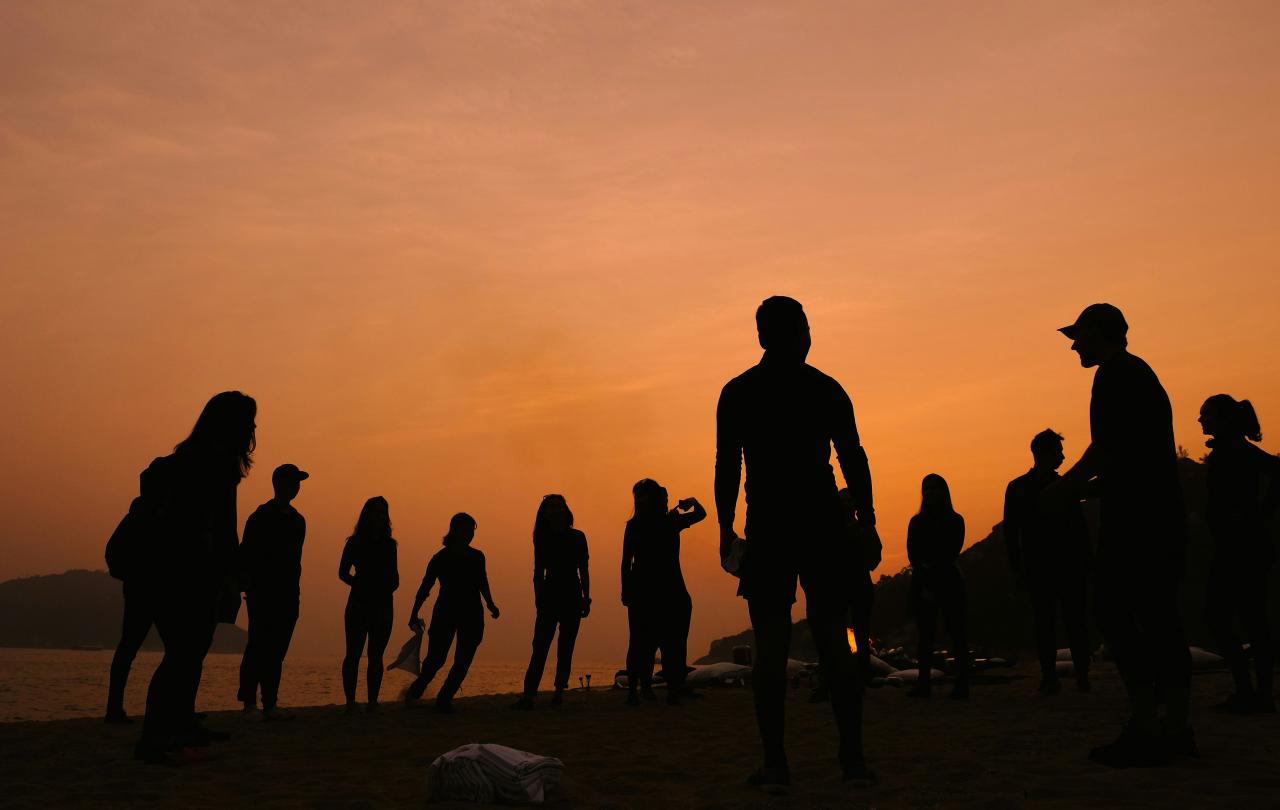
Long before Malibu or the post-industrial North Shore of Oahu, surfing held an integral role in Pacific Island societies. As Ben Finney and James Houston explain, surfing was a religious practice for ancient Hawaiians. With stocks of morning glory, they lashed the ocean’s surface, chanting “Arise, great surfs from Kahiki.” This compelled the spirits - animating the swells - to foster good waves, therefore good “stoke” (to use a modern idiom).
When I first started to surf, I detected such enchantment. Almost nothing brought me closer to transcendence. On good days, my Sabbath rituals would be galvanized by peeling waves paired with a cold saltwater plunge, somewhat like those Russian Orthodox plunges on January 6th (minus the ice).
And despite the rapid secularization of the West, surfing remains a precious religious ritual. For Christians, Buddhists, New Age spiritualists, etc.—anyone who meets the ocean on her own terms. All speak with reverence about the waves.
Surfers tend to be deeply serious people, distanced from their hash-smoking, dread-headed depictions in pop culture. Some might argue that they take themselves too seriously, one day conducting American counterculture and the next protesting the Vietnam War on the grounds that war disrupts the proverbial Tao.
Such is the genius of Francis Ford Coppola’s iconic surfing motif from the film Apocalypse Now. Here, Lieutenant Colonel Bill Kilgore, trying to find a rational explanation for the Vietnam War, declares “Charlie don’t surf!” with an odd tone of vulnerable bravado. Somewhere in this declaration, we find a longing for peace and transcendence, despite the chorus of machine guns and napalm that inevitably follow. For him, surfing was an antidote to chaos—a sort of victorious peace ritual following the horrors of battle.
Despite the chaos––constant chorus of swells and seagull cries––the ocean remains noiseless in a spiritual sense. She quiets anyone nearby.
Jaimal Yogis, author of Saltwater Buddha, forthrightly connects surfing to enlightenment. In Hawaii, he studied dharma and traditional philosophy, living like Jack Kerouac and Kelly Slater combined: “[mastering] all the waves (internal and external).” There exist many paths to enlightenment, Yogis adds in his follow-up A Surfer’s Guide to Buddhism. Surfing is just one route through the ocean of suffering, albeit more appealing than ancient asceticism.
Surfing, Peter Kreeft claims, is akin to Buddhism in that they both contain unique words for their unique “highs”: ‘stoke’ and Nirvana. In a little book called I Surf, Therefore I Am, Kreeft regards surfers as Aristotelian disciples, chasing life’s greatest good (happiness) before anything else. In that respect, surfers live truthfully to the Ethics.
The activity of surfing, he says, transports a person into timeless happiness. ‘Stoke’ is a mystical ebullience, ecstasy of a sacred kind because ‘stoke’ is not a fleeting thing. It sustains itself both during and after the activity which creates it––a pure and lasting joy. “Maybe surfing brings us back to the timelessness of Eden,” Kreeft says.
Ancient Celtic monks found the seashore ideal for spiritual refuge, regarding their pilgrimage to the sea as following Christ into the desert. Visiting the ruins of one of these seaside monasteries, Dr. Ed Newell (author of The Sacramental Sea), felt himself overcome by its solitude. The ascetic life on the isle of Papa Stronsay seemed spiritually claustrophobic, he says.
These monks were not surfers (to our knowledge). They were beach bums. They recognized a simple, solemn truth about the sea: its intense solitude. Despite the chaos––constant chorus of swells and seagull cries––the ocean remains noiseless in a spiritual sense. She quiets anyone nearby, leaving them, as Kierkegaard puts it, silent and “nothing before God.” If we can learn from the lilies and the birds then surely waves and pelicans offer similar wisdom.
When I moved away from the coast for school, this was the most intense realization. Now, my life is full of constant noise. I thirst for that vast silence that nourished me back home. And while Kreeft is right, that ‘stoke’ never truly dissolves, adjusting to life away from the waves has been a terrible trial. During the first week in the dorms, the thought of rolling swells kept me awake and staring at the ceiling. I would instinctively open my window, only to realize that there was no distant sound of crashing waves to put me to sleep. There was, and has been, something dislodged ever since leaving the sea.
And so, today, I skipped class and stood at the edge of the Pacific Ocean. A fierce storm – bearing the name La Ninia – raged across the Oregon Coast. Sideways rain pelted my face. Though coated in a 5mm wetsuit, my fingers were already painfully numb before stepping into the sea, which was probably 5°-10°C.
I paddled past the breaking waves and rediscovered what was missing. The part of myself that never made it to university. I ditched my nine-foot fiberglass longboard for a moment and thought about nothing: floating, staring into the blankness of the gray sky. My body went numb and became weightless, the existential burdens vacating with each rise and fall of the swell. Once again, I was alone and silent before God. And despite losing myself in the vastness––the overwhelming silence––of that moment, I found myself entirely.
Join with us - Behind the Seen
Seen & Unseen is free for everyone and is made possible through the generosity of our amazing community of supporters.
If you’re enjoying Seen & Unseen, would you consider making a gift towards our work?
Alongside other benefits (book discounts etc.), you’ll receive an extra fortnightly email from me sharing what I’m reading and my reflections on the ideas that are shaping our times.
Graham Tomlin
Editor-in-Chief





